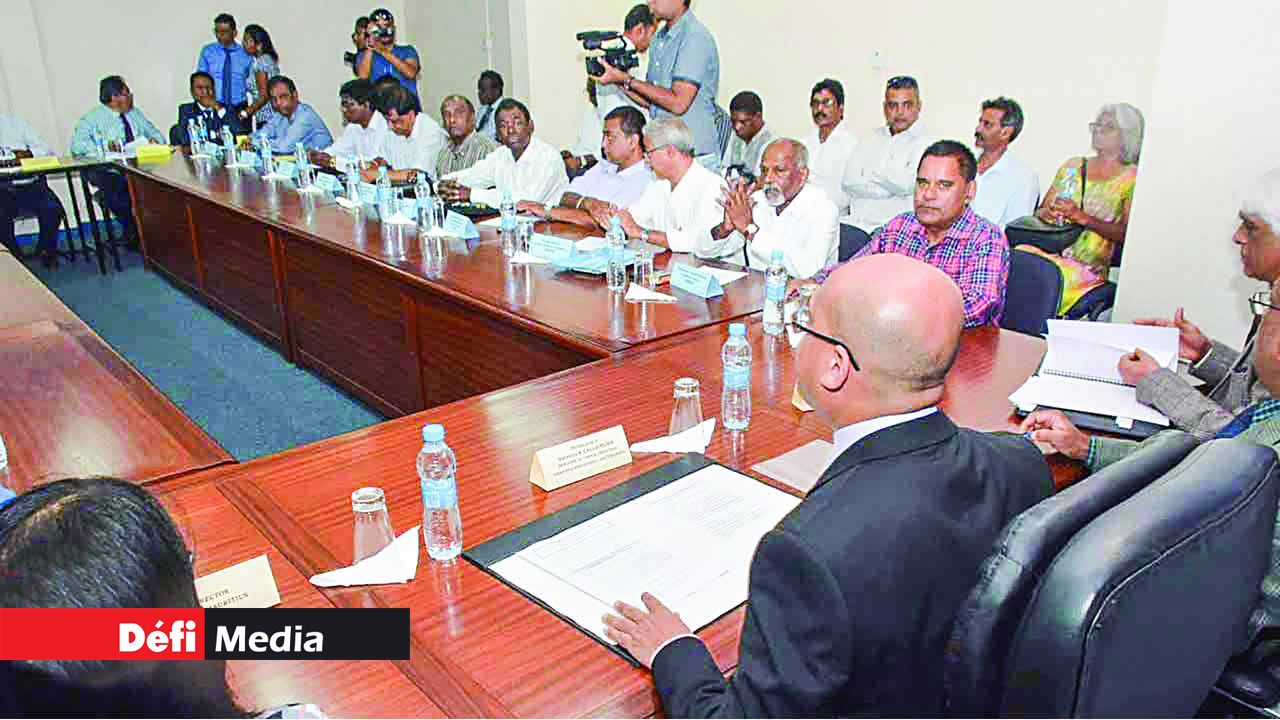
Workers’ unions are impatiently awaiting two important decisions of the government: the amount of salary compensation that will be paid as from January 2018 and the minimum wage that will be recommended by the National Wage Consultative Council. The first tripartite meeting held on Wednesday will be followed by a second one scheduled next week and chaired by the Prime Minister.
Publicité
Two major announcements will mark this month of November 2017: The salary compensation quantum and the national minimum wage. The salary compensation involves two tripartite meetings comprising of government representatives, employers and trade unions. All unions of both the public and private sectors have been invited to submit their proposals which will be examined by a technical committee.
The first meeting held on Wednesday was chaired by the Minister of Labour, Industrial Relations, Employment and Training. The second meeting scheduled for Wednesday 22 November will be chaired by the Prime Minister who will then announce the salary compensation figure.
Every year, workers’ unions make their proposals and expect to receive a fair amount, while employers fear a high amount might affect enterprises in the form of higher labour cost. Government always announces an indicative amount, leaving those employers who can afford free to pay more.
Labour Minister Soodesh Callichurn said he was satisfied that the meeting was very cordial and that the government will propose an amount at the next meeting. Rashid Imrith, president of the Federation of Civil Service and other Unions, on his side, said that his union awaits the report of the technical committee. He expects the compensation amount for those at the lower end of the social ladder to be higher than others.
Reaz Chuttoo, of the Confederation of Private Sector Workers, wants Statistics Mauritius to give details of the ‘basket of goods’ used to calculate the inflation rate and the ‘average income expenditure’ for 2017. He is asking the government to take a ‘political decision’.
Ashok Subron of the ‘Rezistans ek Alternativ’ claims that the salary compensation cannot be less than Rs 600 because at the end of 2014 when the inflation rate was 3.2%, the government granted Rs 600 compensation in January 2015 (see table below). Trade union leaders also want to know how many workers earn less than Rs 14,000 and how many workers earn more than Rs 100,000 a month.
Overall, there is great speculation on the amount that will be announced and workers expect it to be much higher than last year, given a high inflation rate forecasted for this year. To recall, in January 2017, when the inflation rate was as low as 1 percent, those earning a salary of up to Rs 15,000 obtained a compensation of Rs 200 while those earning between Rs 15,001 and 50,000 received Rs 125. The total compensation bill amounted to nearly Rs 2 billion.
|
||||||||||||||||||||||||||||||||||||||||||||||||||||||||||||||||
Inflation in 2017
According to Statistics Mauritius, the inflation rate is likely to hit 3.6 percent by the end of the year. Factors that have contributed to a higher inflation compared to last year include higher prices for vegetables, fuel, alcoholic drinks and cigarettes. But is the determination of compensation quantum really linked to the inflation rate? Gavin Ng, Analyst, argues that this is not necessarily the case.
“If we look at the trend over the past few years, we note there is no direct correlation between the amount paid and the actual inflation rate. For example, in December 2014, when the rate of inflation was 3.2%, the amount announced was Rs 600. In December 2013, when inflation was at 3.5%, the amount paid was only Rs 300. In 2015, with a rate of 1.3% the amount was Rs 150 but in 2016, with inflation falling to 1%, the compensation increased to Rs 200. For this year, it depends on the country’s capacity to pay.”
An established tradition
Salary compensation is a well established tradition in Mauritius. It is a method to compensate workers for the loss of purchasing power following general rise in prices of basic commodities. The amount to be paid is based by the rate of inflation.
Every year, workers’ unions make their proposals and expect to receive a fair amount, while employers fear a high amount might affect enterprises in the form of higher labour cost. Government always announces an indicative amount, leaving those employers who can afford free to pay more.
Minimum wage : Trade unions disappointed
Before the salary compensation for 2018 is known, the National Minimum Wage Committee has already given a hint on its report on the minimum salary. On Thursday, the committee, working under the aegis of the National Wage Consultative Council, announced that the minimum salary will be in the range of Rs 8,000 to Rs 8,500. This amount has not been welcomed by Trade Unions.
In April 2017, the Chairman, Mr Beejaye Coomar Appana, had stated that the report would be ready by October this year and the recommended minimum salary would be applicable as from next year. The report will have to be first validated by the Cabinet today, Friday, before being officially released. The concept of a ‘minimum salary’ has been high on the agenda of local trade unions for ages. In 2014, the Alliance Lepep announced in its electoral manifesto that it would come up with the minimum salary once in power.
A minimum wage or a minimum salary is the lowest remuneration that employers can legally pay their workers. Equivalently, it is the price floor below which workers may not sell their labour. The first modern national minimum wage law was enacted by the government of New Zealand in 1894, followed by Australia in 1896 and the United Kingdom in 1909. In the United States, statutory minimum wages were first introduced nationally in 1938, and they were reintroduced and expanded in the United Kingdom in 1998.
Feizal Ally Beegun : “We expect at least Rs 800”
 Trade Unionist Feizal Ally Beegun says he expects a decent minimum wage for all workers whose contribution to the economy must be adequately recognised, whatever the sector they are engaged in. “It is most unfortunate that, after 50 years of independence, we still have workers earning less than Rs 6,000 a month. Recently, we saw how women cleaners protested at being paid only Rs 1,500 a month.
Trade Unionist Feizal Ally Beegun says he expects a decent minimum wage for all workers whose contribution to the economy must be adequately recognised, whatever the sector they are engaged in. “It is most unfortunate that, after 50 years of independence, we still have workers earning less than Rs 6,000 a month. Recently, we saw how women cleaners protested at being paid only Rs 1,500 a month.
We always say that Mauritians do not want to work in some sectors, but the real reason is because of the low wages, and that is why enterprises have recourse to foreign labour. If we pay a decent salary, for example above Rs 10,000, then Mauritian workers would be interested to work in textiles and construction sectors,” explains the trade unionist. And what does he expect as salary compensation?
Feizal Ally Begun argues that every year unions come up with their own proposals, and after deliberations, government imposes its final figure, which often does not adequately compensate the loss of purchasing power. This year, we are set to have a high inflation rate, as there has been a price rise in many essential commodities, so we therefore expect a compensation of at least Rs 800. We must realise that salary compensation does not concern only workers but also pensioners, widows and invalids.
If the government really wants to fight poverty, then it must come up with a significant minimum salary and a reasonable compensation rate.” But will private enterprises have the capacity to pay a high rate? The unionist argues that all stakeholders can always discuss this together. We are used to hear threats of relocation or redundancies. But we believe solutions can be found.”
Darmen Appadoo : “Why not lower the VAT rate?”
 Darmen Appadoo, a social worker, claims that there are other ways to compensate consumers and workers for the loss of purchasing power and bring more justice, fairness, relief and combat poverty. “If prices have been rising, then one way to dilute the effect on consumers is to lower the VAT rate.
Darmen Appadoo, a social worker, claims that there are other ways to compensate consumers and workers for the loss of purchasing power and bring more justice, fairness, relief and combat poverty. “If prices have been rising, then one way to dilute the effect on consumers is to lower the VAT rate.
For example, bringing the VAT rate to 13 percent will bring major relief to the population at large. Every year we hear that the government or the private sector does not have the means to pay a high compensation rate. But why can’t the government lower the VAT rate? This will benefit everyone.
We have seen how the government recently changed the criteria for being eligible to the Negative Income Tax, which is a laudable initiative, but at the same time, it shows how the government had initially rushed with this measure and had to review it later.”
Minimum wage : a package of Rs 8,500 has been proposed
The National Wage Consultative Council (NWCC) has proposed to pay Rs 8,000 as from January 2018 and Rs 8,500 as from January 2019. However, trade unionists on the NWCC technical committee did not reach a consensus. They regret that they have not been able to read the report of the NWCC in their entirety and claim to have had access only to the Executive Summary.
They did not reach a consensus on the proposed salary of Rs 8,500. Beejaye Kumar Appanah, chairman of the advisory council, had to suspend the meeting held on Thursday afternoon for about fifteen minutes. The chairman of the Government Services Employees Association (GSEA), Radhakrishna Sadien, who attended the meeting, explained that a referral was requested "for clarification." “We also think that legal advice is needed. That's why we said we cannot do anything today. The Chairman has asked for a break to decide whether there will be a referral or not,” he said.

Notre service WhatsApp. Vous êtes témoins d`un événement d`actualité ou d`une scène insolite? Envoyez-nous vos photos ou vidéos sur le 5 259 82 00 !






















